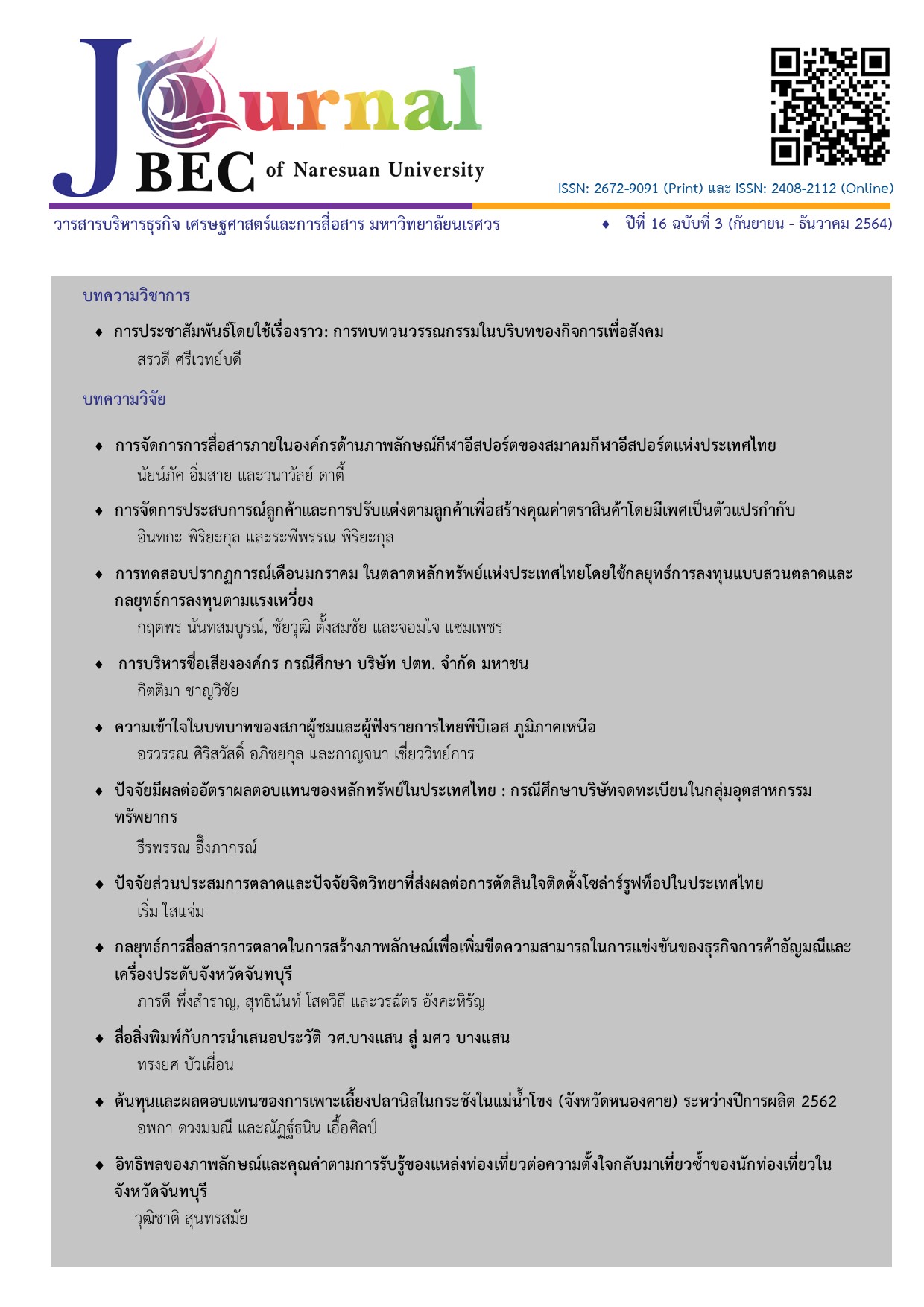ปัจจัยส่วนประสมการตลาดและปัจจัยจิตวิทยาที่ส่งผลต่อการตัดสินใจติดตั้ง โซล่าร์รูฟท็อปในประเทศไทย
Main Article Content
บทคัดย่อ
การวิจัยนี้มีวัตถุประสงค์เพื่อ (1) สำรวจคุณลักษณะของผู้ติดตั้งโซล่าร์รูฟท็อป พฤติกรรมการติดตั้งปัจจัยจิตวิทยา ปัจจัยส่วนประสมการตลาด และการตัดสินใจติดตั้งโซล่าร์รูฟท็อปในประเทศไทย (2) วิเคราะห์ปัจจัยจิตวิทยาที่ส่งผลต่อการตัดสินใจติดตั้งโซล่าร์รูฟท็อปในประเทศไทย (3) วิเคราะห์ปัจจัยส่วนประสมการตลาดที่ส่งผลต่อการตัดสินใจติดตั้งโซล่าร์รูฟท็อปในประเทศไทย การวิจัยนี้ใช้ระเบียบวิธีวิจัยเชิงปริมาณ กลุ่มตัวอย่างที่ศึกษาคือ ผู้ได้รับคัดเลือกเข้าโครงการจำหน่ายไฟฟ้าจาก
แผงโซล่าเซลล์ภาคครัวเรือน(โซล่าร์รูฟท็อป) จำนวน 376 คน ใช้วิธีการสุ่มตัวอย่างแบบชั้นภูมิ และสุ่มตัวอย่างอย่างง่าย
เก็บรวบรวมข้อมูลด้วยแบบสอบถาม การวิเคราะห์ข้อมูลใช้สถิติเชิงพรรณนา ทดสอบสมมติฐานโดยใช้สถิติสมการถดถอยโลจิสติกส์
ผลการวิจัยพบว่า (1) กลุ่มตัวอย่างส่วนใหญ่เป็นเพศ ชาย อายุ 51-60 ปี การศึกษาปริญญาตรี อาชีพกิจการส่วนตัวรายได้เฉลี่ยต่อเดือน 30,001-60,000 บาท (2)ปัจจัยจิตวิทยาด้าน ทัศนคติ ส่งผลต่อการตัดสินใจติดตั้งโซล่าร์รูฟท็อปในประเทศไทย (3) ปัจจัยส่วนประสมการตลาดด้าน ราคา ช่องทางจัดจำหน่าย และการสื่อสารการตลาดแบบบูรณาการส่งผลต่อการติดตั้งโซล่าร์รูฟท็อปในประเทศไทย
Article Details

อนุญาตภายใต้เงื่อนไข Creative Commons Attribution-NonCommercial-NoDerivatives 4.0 International License.
เอกสารอ้างอิง
Alternative Energy Development and Efficency. (2017). Thailand PV Status Report 2016 -2017. Retrived March 15, 2019, from https://webkc.dede.go.th/testmax/sites/default/files/Book%20TPSR%20THAI.pdf
Alternative Energy Development and Efficency. (2018). Thailand_Alternative_Energy Situation 2018. Retrived March 15, 2019, from http://webkc.dede.go.th/testmax/sites/default/files/Thailand Alternative_Energy_Situation_2018.pdf
Aramnet, C. (2019). Solar Energy villege for electrical saving (Energy for All).
Retrived April 18, 2020, from https://www.komchadluek.net/news/edu-health/387929
Energy Policy and Planning Office. (2018). Energy Statistics of Thailand. Retrived March 15, 2019, from https://drive.google.com/file/d/1WcNsEWr93CmhqQpMJMVbdHRNaQVwr_d4
/view
Energy Regulatory commission (2015). Power purchase from Solar Energy and Related Regulation. Retrived March 15, 2019, from http://www.erc.or.th/ERCWeb2/Upload/Document/part3-Solar-Feb%2024%202015-regulation.pdf
Kanjanavasri, S., Petayanon, T., & Srisuko, D. (2008). Statistics for Research. (5th ed.) Bangkok: Boonsiri Printing.
Kriwan, Y.(2008). Essentials of Statistics and SPSS. Bangkok: pim-dee.
Lui, C, M .(2015). The Factors affecting the Dicision to Install Solar roof in Bangkok. Retrived March 15, 2019, from https://www.dspace.bu.ac.th/bitstream/123456789
/2131/1/xiaomei_liu.pdf.
Cronbach, L. J. (1990). Essentials of psychological testing (5thed.). New York: Harper Collin.
Kotler, P. & Armstrong G. (2010). The Four Ps of the Marketing Mix. Principle of Marketing, (13thed.). New Jersey: Pearson International Edition.
Kotler, P. & Keller, K. L. (2012). Marketing management (14thed.). New Jersey: Pearson International Edition.
Rai., V. & McAndrews., K. (2012). Decision-Making and Behavior Change in Residential Adopters of Solar PV. Retrived November 10, 2018, from https://citeseerx.ist.psu.edu/viewdoc/download?doi=10.1.1.463.3935&rep=rep1&type=pdf
Schiffman L.G. & Kanuk, L.L. (2007). Customer Behavior. (9th ed). New Jersy: Prentice Hall.
Schiffman L.G. & Kanuk, L.L. (2010). Customer Behavior. (10th ed). New Jersy: Prentice Hall.
Sun.,P.C., Wang., H.M., Huang.,H.L. & Ho., C.W. (2018). Consumer attitude and purchase intention toward rooftop photovoltaic installation: The roles of personal trait, psychological benefit, and government incentives. Joural of Energy & Environment, DOI: 10.1177/0958305X17754278.
Trudel., R. (2018). Sustainable consumer behavior. Consumer Psychologocal review. pp.85-96, DOI: 10.1002/arcp.1045. Retrived November 10, 2019, from http://www.researchgate.net/publication/329536748.


